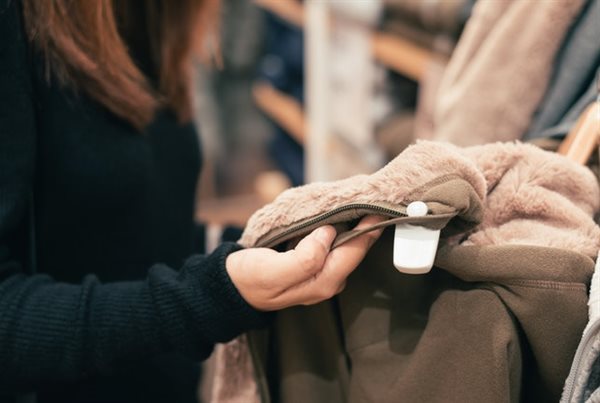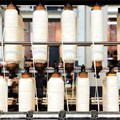Top fashion brands remain reliant on synthetics, guilty of greenwashing - report

The European report analysed almost 50 major fashion brands; out of these it assessed 46 of the world’s supposedly most transparent brands, from high street to luxury, including Zara, Primark, H&M and Burberry on the amount of fossil fuel-based materials in their collections and commitments to move away from them.
A further part of the investigation – scrutinising 12 brands and over 4,000 products – reveals that brands are routinely deceiving consumers with false green claims. The majority of brands made sustainability claims, with 39% of the products studied having some kind of green claim attached to them. Fifty-nine percent of green claims flouted the UK Competition and Markets Authority guidelines in some way.
The worst offenders were H&M with 96% false claims, Asos with 89% and M&S with 88% false claims. H&M’s Conscious Collection was also found to contain an even higher share of synthetics than the main one (72% compared to 61%).
Few commitments to reduce use of synthetics
The report exposed the extent of the fashion industry’s addiction to fossil fuel-based fibres. While some brands are making commitments to move away from using virgin polyester, they make no such commitment regarding synthetics in general.
Most brands aim to address the fossil fashion problem by replacing virgin polyester with downcycled single-use plastic bottles, a false solution because it is a one-way street to landfill or incineration, says the Changing Markets Foundation.
The brand assessment found that:
• 59% of sustainability claims by European brands were unsubstantiated or misleading, with H&M, Asos and M&S being the worst offenders.
• 85% of Boohoo products contained some type of synthetics, with 60% being 100% virgin synthetics.
• Zara’s group, Inditex, reported one of the highest uses of synthetics by weight – comparable to that of sports giant Nike.
• No company made a clear commitment to phase out the use of synthetic fibres from their collections.
Urska Trunk, campaign manager at Changing Markets said: “While brands are quick to capitalise on consumer concern by using sustainability as a marketing ploy, the vast majority of such claims are all style and no substance. While they greenwash their clothing collections, they are simultaneously dragging their feet on embracing truly circular solutions, for example by not making the necessary investments to ensure a future in which clothes can be recycled back into clothes.”
Well over three quarters (85%) of companies plan to reach sustainability standards with the false solution of recycled plastic bottles, the study said.
H&M reported that 90% of its recycled polyester comes from single-use plastic bottles. Like H&M, Primark and Zara’s group Inditex rely on the false solution of downcycling single-use plastic bottles. Unlike others, however, Inditex reported that it has invested €3m to fund tech innovation exploring textile recycling solutions, including the MIT-Spain Inditex Circularity Seed Fund.
While this is a first step, it only represents 0.08% of the company’s 2019 net profits, and the report finds that significantly larger investments into true circular economy solutions by brands are needed.
The problem with synthetics
According to the foundation, synthetic fibres represent over two-thirds (69%) of all materials used in textiles. This figure is expected to balloon to nearly three quarters by 2030, of which 85% will be polyester, a material produced from fossil fuels such as oil and fracked gas3. The production of synthetic fibres currently accounts for 1.35% of global oil consumption, which exceeds the annual oil consumption of Spain and amounts to 1.29 billion barrels of oil a year.
Cheap synthetic fibres are not only harmful because they enable low-quality clothing that ends up in waste, but also perpetuate the fashion industry’s dependence on fossil-fuel extraction during a climate emergency.
Microplastics also emerged as a critical blindspot for most brands. Despite the known damage they cause to human and environmental health – including recent research which has found microplastics in placentas, stools and even able to cross the blood-brain barrier – the vast majority of brands were found to be asleep at the wheel when it comes to microplastics, delaying meaningful action by citing uncertainty and calling for even more research.
Greenwashing offenders
European brands emerged as some of the worst for greenwashing, with an average of 59% of claims by European companies being unsubstantiated or potentially misleading to consumers.
Examples of brands misleading consumers include claims that synthetic products are recyclable when no such recycling technology exists, where claims are made with no supporting evidence given for products being labelled as ‘sustainable’ or ‘responsible’, or when brands were not specific about the amount of recycled content included in the product.
Of all the brands analysed, Zara and Gucci made the fewest claims deemed to be misleading; on the other end of the spectrum, claims by 96% of H&M (96%), Asos (89%) and M&S (88%) flouted guidelines in some way.
H&M’s Conscious Collection not only uses more synthetics than in its main collection but also one in five items analysed were found to be made from 100% fossil-fuel-derived synthetic materials. M&S has rebranded blended synthetics to seem high-tech, with a line of Cashmillion virgin synthetic faux-cashmere clothing, and relies heavily on discredited certification schemes for cotton.
Transparency lacking
The 15 worst performing brands assigned minimum to no transparency about their information about the use of synthetics Patagonia, Boohoo, Burberry and Nike.
Despite many well-known sustainability claims, Patagonia refused to respond to the assessment and discloses no information on its website about its use of synthetics, nor does it outline any specific commitment to reduce its reliance on them. While it encourages people to ‘buy less, demand more’ and to ‘join the fight against irresponsible, fast-fashion manufacturing’ it makes no commitment to move away from synthetics altogether.
Additionally, Patagonia advertises ocean plastics and fishing nets as a better alternative to virgin plastic, yet this is an approach that does little to stop the flow of plastics into the environment and only deals with the aftermath of the plastic pollution problem, says the Changing Markets Foundation.
Similarly, Adidas boasts an ocean collection and relies on single-use plastic bottles for most of its products, yet reported that 90% of its apparel articles are made or blended with synthetics.
Report recommendations
Not a single brand ranked as a frontrunner for their approach to synthetics; coupled with the greenwashing exposed in the report this suggests that the industry has a long way to go to contribute to tackling the climate and plastic crises in a meaningful way.
The report urges brands to tackle their addiction to fossil fuel-derived synthetics, to commit to ambitious climate targets and invest in truly circular solutions. Consumers are encouraged to think twice about their purchases and to question the integrity of the shops they are buying from before purchasing.
Finally, ahead of the upcoming EU textile strategy, the report asks legislators to take action to address low-quality clothing mass-produced by the fast fashion industry and ensure that brands become more transparent and responsible about their supply chains and the end-of-life of their products. In addition, measures are needed to end greenwashing, which the report found to be rampant in the industry.
Related
Rethinking welding techniques can revolutionise sustainability 20 Feb 2025 Propelair: One shade of green 13 Feb 2025 Old Khaki and The Street Store join forces to promote sustainable fashion 13 Feb 2025 #BizTrends2025: Twyg's Jackie May - Is sustainable fashion possible? 5 Feb 2025 #BizTrends2025: Sustainable demolition is key for circular construction 23 Jan 2025 #BizTrends2025: Why 2025 looks green for SA 20 Jan 2025




